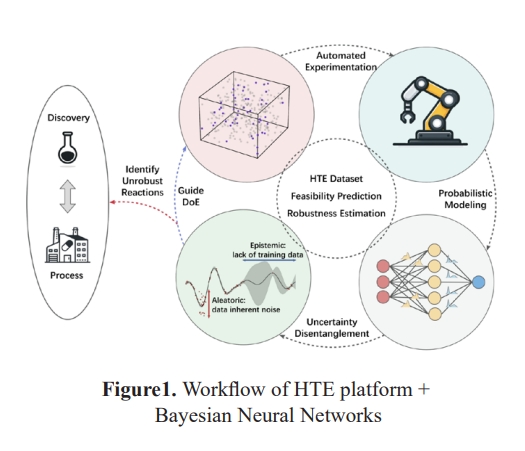EXTENDED ABSTRACT: Predicting organic reaction feasibility and robustness against environmental factors is a longstanding challenging. We address this by integrating high throughput experimentation and Bayesian deep learning. Unlike prior studies focused on niche chemical spaces, our platform conducted 11,669 distinct acid-amine condensation reactions in 156 working hours, yielding the largest single reaction type dataset at a volumetric scale for industrial delivery. Our Bayesian neural network model achieved a new benchmark with 89.48\% accuracy for reaction feasibility prediction. Furthermore, our fine-grained uncertainty disentanglement enables efffcient active learning, reducing 80% of data requirements. Our uncertainty analysis effectively identifies out-of-domain reactions and evaluates reaction robustness against environmental factors, offering a practical framework for navigating chemical spaces and designing highly robust reactions for industrial processes. This work has been integrated into the industrial development pipeline of ChemLex.

Keywords: High-Throughput Experimentation; Bayesian Learning; Organic Chemistry;
REFERENCES: [1] H. Zhong et al, ChemRxiv, doi:10.26434/chemrxiv-2024-gt72l, 2024 (preprint)

Tianshu Yu, who received his Ph.D. from Arizona State University, is currently an assistant professor, doctoral supervisor, and director of the LOGO Lab at the School of Data Science, The Chinese University of Hong Kong (Shenzhen). He has long been engaged in theoretical research on AI4Science, as well as its applications in material design, chemical engineering, and other ffelds, and has in-depth cooperation with many material and chemical-related companies. He has published more than 30 papers in academic conferences/journals such as NeurIPS, ICLR, IEEE Trans. on PAMI, and RSC Digital Discovery; he is the head of several sub-projects of National Key Projects. From 2024, he serves as the editor-in-chief of the international journal “Science Digitalization” (AIMS Publishing).